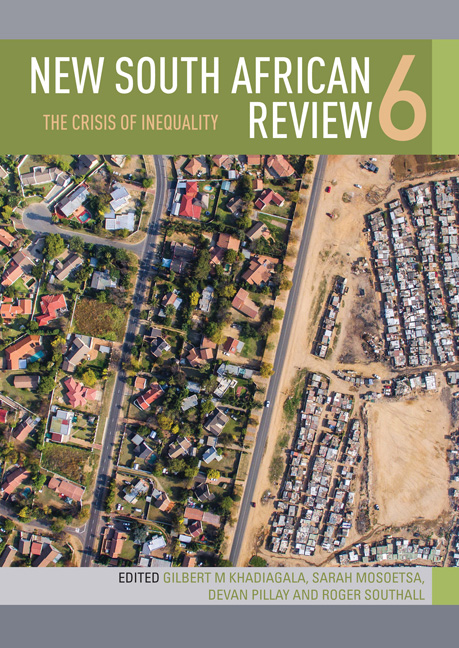Book contents
- Frontmatter
- Contents
- List of tables and figures
- INTRODUCTION: The global crisis of inequality and its South African manifestations
- PART 1 INEQUALITY AND CLASS: POLARITIES AND POLICIES
- CHAPTER 1 Inequality in South Africa
- CHAPTER 2 A national minimum wage in South Africa: A tool to reduce inequality?
- CHAPTER 3 The politics of poverty and inequality in South Africa: Connectivity, abjections and the problem of measurement
- CHAPTER 4 The financialisation of the poor and the reproduction of inequality
- PART 2 THE POLITICS OF INEQUALITY
- PART 3 SOCIAL DIMENSIONS OF INEQUALITY
- PART 4 LAND AND ENVIRONMENT
- Contributors
- Index
CHAPTER 1 - Inequality in South Africa
from PART 1 - INEQUALITY AND CLASS: POLARITIES AND POLICIES
Published online by Cambridge University Press: 23 March 2018
- Frontmatter
- Contents
- List of tables and figures
- INTRODUCTION: The global crisis of inequality and its South African manifestations
- PART 1 INEQUALITY AND CLASS: POLARITIES AND POLICIES
- CHAPTER 1 Inequality in South Africa
- CHAPTER 2 A national minimum wage in South Africa: A tool to reduce inequality?
- CHAPTER 3 The politics of poverty and inequality in South Africa: Connectivity, abjections and the problem of measurement
- CHAPTER 4 The financialisation of the poor and the reproduction of inequality
- PART 2 THE POLITICS OF INEQUALITY
- PART 3 SOCIAL DIMENSIONS OF INEQUALITY
- PART 4 LAND AND ENVIRONMENT
- Contributors
- Index
Summary
More than two decades after its transition to democracy, South Africa has remained one of the most unequal countries in the world. The question is why this situation has persisted despite the elimination of apartheid laws and the establishment of one of the world's largest redistributive programmes.
To answer that question, this chapter first reviews measures of income inequality in South Africa overall and then by race, gender and location. The second section explores persistent inequalities in income from economic activity, while the third assesses the impact of state efforts to redress them.
High joblessness and unusual inequalities in earned incomes and asset ownership gave rise to South Africa's unusual inequality. State programmes focused on improving state services for the poor rather than restructuring the institutions that sustained exclusionary economic systems. In particular, economic programmes did not prioritise job creation, livelihood strategies for the jobless, more equitable workplaces or quality general education for the majority of children.
THE DISTRIBUTION OF INCOME
The core measure of inequality in any society centres on class differences, reflected in the distribution of income. In South Africa in 2016, economic inequality still largely tracked race, gender and location, although with the end of apartheid the first two gradually became less determinant.
The overall distribution of income
Most studies found that South Africa ranked poorly, often worst, among countries that reported on economic inequality. It had the highest Gini coefficient reported in the World Bank's World Development Indicators from 2006 to 2014 (the higher the Gini, the greater the income inequality). Excluding South Africa, the average Gini coefficient for the reporting countries, weighted by population, was 39; for South Africa it was 63. Although the data on Gini coefficients were at best indicative, there is no question that in the 2010s inequality in South Africa ranked among the worst in the world. The poorest 10 per cent of households earned under R10 000 a year in 2015. The richest 10 per cent earned over R265 000 a year. According to tax data, in 2014 the richest 4 per cent of individuals earned over R750 000 a year (calculated from SARS 2016a).
- Type
- Chapter
- Information
- New South African Review 6The Crisis of Inequality, pp. 14 - 42Publisher: Wits University PressPrint publication year: 2018



